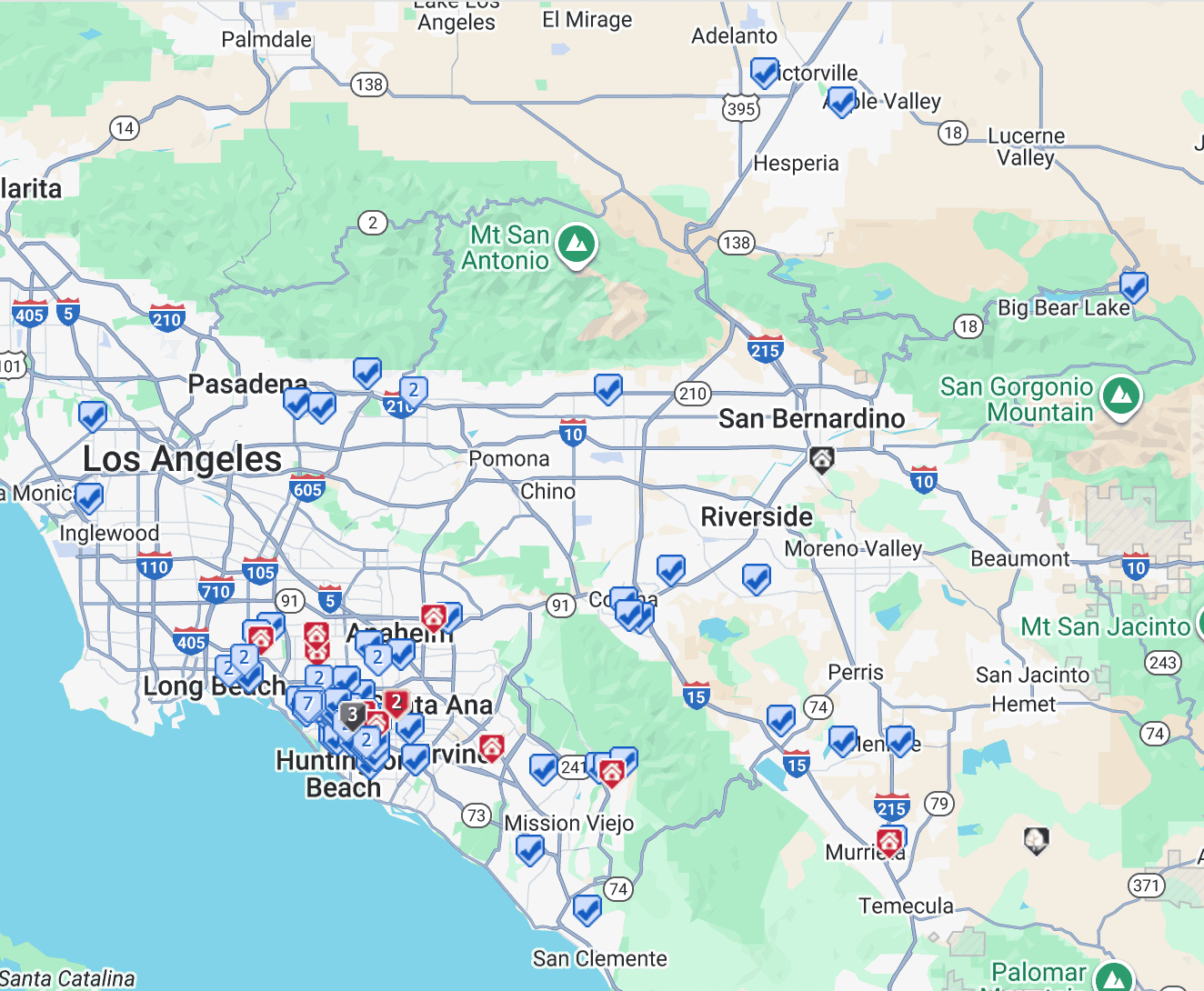
There are many reasons you may wish to rent out your property. For example, you may have inherited a house but have no plans to live in it. Perhaps you’re moving into a larger home, but wish to rent your current house for supplemental, passive income. On the other hand, you may have invested in a great rental property but feel unsure where to begin in finding and maintaining great tenants. For many, renting out their house can be a great way to earn extra income.
Whatever your reasons, knowing how to rent your house before jumping in headfirst is essential. From preparing your home for renters, to familiarizing yourself with rental laws, there’s much to learn before transitioning from homeowner to landlord.
Here’s a complete guide to renting out your house, including tips to maximize rental income while minimizing the work you’ll have to do.
How to Rent Your House Successfully: 7 Essential Steps
1. Research local laws
There are a few critical things to do before renting out your house. First, ensure your home is up to code and safe. Both state and local governments have a set of building codes in place that set minimum safety standards for housing conditions and are mandatory for landlords to abide by. Depending on your property's location, these codes may cover maintenance, sanitation, electrical, and fire safety. Research your local and state regulations and make necessary updates.
After this, the easiest way to guarantee your house is up to code is to get a home inspection. Ensuring your property is rental-ready and up to code can save you thousands of compliance fines. Make sure you have a professional walk through the house and give you their seal of approval.
2. Determine a competitive price
When determining how to rent your house, you must conduct market research and choose how to set your rental prices. First, evaluate different neighborhoods in your area. Next, identify how your neighborhood compares. For example, is your house near a good elementary school? Is it close to supermarkets and parks? Or is it further away from these kinds of amenities? These are factors to consider when setting your monthly rent.
Still wondering, “How much can I rent my house for?” You can look at rental websites and compare how other property owners are listing their rental properties.
3. Create an advertising plan
Gone are the days when renting your house meant all you had to do was to put a sign in your yard. Today, you’ll likely have to find residents by posting your property on rental websites. Many websites offer free listing services, though you may find paid postings. Facebook Marketplace, Rentals.com, and Zillow are all good options.
You can list your property on various websites to ensure you get a good cross-section of applicants. Advertising and marketing can be challenging for the new landlord. Keep reading for more specific rental advertising and marketing tips.
4. Screen and meet prospective tenants
After successful advertising, marketing, and maybe even a few in-person showings, you’ll have a stack of applications to sort through. Screening tenants can be a time consuming and difficult process. Sifting through applications and meeting prospective tenants can become a full time job.
Common courtesy and the Federal Fair Housing Act dictate that you must treat all prospective tenants equally. But, some factors will make some applicants more promising than others.
- Financial Information. Most importantly, you want a tenant who is financially responsible and has a good credit score.
First, you should run a credit check on your applicants and ensure they have a relatively good credit score. In their credit report, you’ll also see their income-to-debt ratio. If their monthly debt payments are too high, even if they have a high income and a good credit score, you may be unable to rely on them to pay their rent on time. Next, you’ll want to collect proof of income. This can include copies of their pay stubs. - Criminal History. After checking credit and income, you should perform a criminal background check. Some states prohibit landlords from discriminating against renters with criminal convictions. Be sure to look up your local renter and landlord laws.
- Know Your Rights (and Theirs Too). Once you’ve picked your perfect resident, you can begin developing your lease. First, however, you should familiarize yourself with local, state, and national landlord and tenant laws. Landlord-tenant laws exist to protect both renters and landlords. These laws dictate how landlords and tenants interact, what rights both parties hold, and what both parties are obligated to do. For example, every landlord has the right to charge a security deposit. However, how landlords store that money depends on state and local laws. So before drafting your lease, you must know the ins and outs of your state’s unique and federal rental laws.
5. Investigate insurance
As a safety precaution, you should also require (or at least encourage) all renters to have insurance. You should detail this information in your lease. Renters insurance covers personal property theft or damage for your residents. Additionally, renters insurance includes liability insurance, so if they have visitors over and someone gets hurt, your tenant will be covered in case they get sued for damages.
Most importantly, your tenant’s insurance will pay for their temporary relocation if your home becomes uninhabitable due to a natural disaster or other catastrophes. While you can focus on repairing your house, your resident will have somewhere to live and won’t have to break their lease with you. Ultimately, this saves you the headache of finding a new tenant, and you won’t lose money as your property sits empty while being repaired.
Additionally, consider securing landlord insurance. Landlord insurance provides a safety net by offering coverage beyond what standard homeowners' insurance typically includes. It protects against potential financial losses resulting from rental property-related risks.
Purchasing this specialized insurance safeguards your investment and mitigates various risks, including property damage, liability claims, and potential loss of rental income. Landlord insurance typically covers structural damage, legal fees, and even certain medical expenses in case of tenant injuries on the property.
6. Develop a lease agreement
A lease, or rental agreement, sets up expectations for your tenants and informs them of property rules. Make your lease highly detailed to avoid any misunderstandings or conflicts in the future. Your lease can either be a fixed-term lease (a lease with a set end date) or a month-to-month lease, which automatically renews until either the tenant or landlord decides to end the rental agreement.
Many online resources exist to help you draft a lease, or you can hire a real estate attorney to help you through the process. However, every lease should include some basic information, including:
- Landlord’s name and contact information
- The address of the home
- All tenant names and contact information
- A list of included appliances in the house
- All utilities and services provided by the landlord
- All utilities and services the tenant is required to pay for
- Circumstances in which the tenant or landlord can terminate the lease early
- The rental amount, due date, and rent payment method
- Whether a security deposit is required, its value, and how it will be managed at the end of a lease
- Tenant parking information
- Permissions in a Lease Agreement
Your lease should also detail any special permissions and services. For example, you must describe whether you plan to allow tenants to keep pets on the property. If you plan to allow pets, you must include a section on pet deposits and rent.
7. Implement a management and maintenance strategy
Once the lease is signed and tenants are moved in, a landlord’s work has only just begun. Next, it’s time to manage and maintain your real estate investment. Landlords should expect to conduct regular inspections, repairs, and upgrades to ensure the property remains in good condition and retains its value.
Establishing a system for handling tenant requests and promptly addressing any issues is also essential. Consider hiring a property manager to help on the maintenance front, especially if you have another full-time job.
Factors to Consider Before Renting Out Your House
Before taking on the responsibility of becoming a landlord, there are some important factors to weigh to guarantee a successful and rewarding experience. Here are a few things you may want to consider when beginning this journey:
Financial Readiness
One of the primary considerations is your financial preparedness. Evaluate your current financial situation, taking into account existing mortgage commitments and other financial obligations. Calculate the potential rental income your property could generate and compare it against anticipated expenses and expected property taxes.
Make sure that you have a clear understanding of your budget, factoring in maintenance costs, repairs, property management fees if applicable, and any unforeseen expenditures.
Market Demand
Consider local rental market dynamics before deciding to rent out your house. It's wise to research the demand and supply of rental properties in your area, taking note of prevailing rental rates and market trends while compiling an analysis of your competitors.
It’s important to understand the demographics of potential tenants and any seasonal variations in demand. Aligning your approach with the local rental market ensures that you strategically set competitive rental prices, tailor your property to appeal to the target demographic, and make informed decisions for a successful and lucrative landlord experience.
Time and Effort
Becoming a landlord requires a significant investment of time and effort. Consider the level of commitment you can dedicate to property management. Landlords are responsible for addressing tenant concerns, handling maintenance issues, and staying on top of legal and regulatory requirements.
Assess your availability and willingness to be actively involved in managing the property or whether you prefer to enlist professional property management services to alleviate some of the responsibilities.
How Property Managers Can Help First-Time Landlords
- They keep you aware of and compliant with all relevant laws
- They help you set your price and market your property
- They find and screen applicants to find the right tenants
- They draft and management leasing paperwork
- They manage maintenance and repair need for your property
- They handle communication with tenants and vendors
- They discover new ways you can generate passive income
How does Prop 19 change the net sheet?








